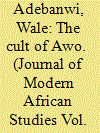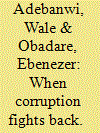|
|
|
Sort Order |
|
|
|
Items / Page
|
|
|
|
|
|
|
| Srl | Item |
| 1 |
ID:
052064


|
|
|
| 2 |
ID:
115835


|
|
|
|
|
| Publication |
2012.
|
| Summary/Abstract |
Streets are sites of hegemony and counter-hegemony, of inclusion and exclusion, of incorporation and expulsion, and of cooperation or conflict. Thus, in the cultural geography of cities, commemorative street names are critical sites of social reproduction. Commemorative street naming is both an historical referent as well as a spatial designation. Recent literature on toponymy calls attention to such practices as important cultural and political arenas for understanding socio-political processes, but often focuses on the politics and sociality of street naming within local, national politics to the exclusion of how local politics intersects with international politics. This article examines the politics of spatial inscription and the social reproduction of 'place' or 'space' on a street corner in New York City named after Kudirat Abiola, an assassinated woman activist in Nigeria, and the retaliatory renaming by the military regime of a Lagos street hosting the US Embassy after the African American anti-establishment activist Louis Farrakhan. Subsequently, the next democratic government of Nigeria renamed the street, this time after the US ambassador, the African American Walter Carrington. Toponymy, the article concludes, can thus be seen as a form of retortion in international relations.
|
|
|
|
|
|
|
|
|
|
|
|
|
|
|
|
| 3 |
ID:
077745


|
|
|
|
|
| Publication |
2007.
|
| Summary/Abstract |
Conflictual relations at the level of political and civil society are usually replicated, represented and re-presented in the media. Where such relations concern territoriality, the media through a discursive strategy, re-fold space into - or re-bind space with - power, producing a territoriality, which not only reflects the political economy of ethno-spatial struggles, but also amplifies these struggles. This essay focuses on how the symbolic manifestation of territoriality - discursive territoriality - was used in the press, within a time-space tapestry, to structure other manifestations. Media framing of the violent Kataf versus Hausa communal clashes and the trials of accused persons in Nigeria is analyzed within the context of the discursive territoriality, which these "communities of discourses" establish and amplify. This case illustrates the fact that struggle over territoriality is simultaneously struggle over identity, resources and power.
|
|
|
|
|
|
|
|
|
|
|
|
|
|
|
|
| 4 |
ID:
084470


|
|
|
|
|
| Publication |
2008.
|
| Summary/Abstract |
This essay examines the 'posthumous career' of Chief Obafemi Awolowo, the late leader of the Yoruba of Nigeria. It focuses on why he has been unusually effective as a symbol in the politics of Yorubaland and Nigeria. Regarding Awolowo as a recent ancestor, the essay elaborates why death, burial and statue are useful in the analysis of the social history of, and elite politics in, Africa. The Awolowo case is used to contest secularist and modernist assumptions about 'modernity' and 'rationality' in a contemporary African society.
|
|
|
|
|
|
|
|
|
|
|
|
|
|
|
|
| 5 |
ID:
108265


|
|
|
|
|
| Publication |
2011.
|
| Summary/Abstract |
This essay analyses the construction of the anti-corruption war under the civilian government in Nigeria between 1999 and 2008. We consolidate existing insights in the literature in three key ways. First, we show that in democratising contexts like Nigeria, the gravest threats to anti-corruption campaigns often emanate from a combination of intra-elite rancour and political intrigue. Second, we provide an explanation of what happens when, literally, corruption fights back. Finally, we suggest that where anti-corruption efforts are not backed by other radical institutional reforms, they fall prey to the overall endemic (systemic) crisis, a part of which, ab initio, necessitated the anti-corruption war.
|
|
|
|
|
|
|
|
|
|
|
|
|
|
|
|
|
|
|
|
|